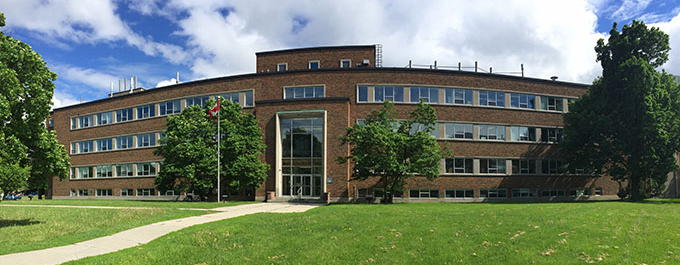The Ottawa Laboratory (Carling) is located on the traditional unceded territory of the Algonquin Anishinaabeg People.
About the Canadian Food Inspection Agency
The Canadian Food Inspection Agency (CFIA) is a science-based regulator with a mandate to safeguard the food supply, protect the health of plants and animals, and support market access. The Agency relies on high-quality, timely and relevant science as the basis of its program design and regulatory decision-making. Scientific activities inform the Agency's understanding of risks, provide evidence for developing mitigation measures, and confirm the effectiveness of these measures.
CFIA scientific activities include laboratory testing, research, surveillance, test method development, risk assessments and expert scientific advice. Agency scientists maintain strong partnerships with universities, industry, and federal, provincial and international counterparts to effectively carry out the CFIA's mandate.

The Ottawa Laboratory (Carling) performs services relating to the safety and quality of food and food-related products across the food chain. These services range from microbiology and chemistry analyses focusing on fertilizers, animal feeds, feed ingredients, and food products, to innovative research in DNA-based techniques such as whole genome sequencing methods and software development for understanding foodborne bacteria.
The laboratory also has expertise in the detection and characterization of food-borne pathogens, food adulteration (food fraud), undeclared and declared food additives (e.g. MSG), irradiated foods, veterinary drugs and mycotoxins (toxins produced by fungi) in animal feeds, and heavy metals in food products and fertilizers.
What we do
Diagnostics
Food, feed, and fertilizer microbiology
- Detect and identify bacterial pathogens, including:
- Salmonella
- Listeria monocytogenes
- E.coli O157:H7 (and other harmful strains)
- Shigella
- Staphlococcus aureus
Food chemistry, feed microscopy and bioanalysis
- Detect and quantify adulteration and contamination.
- Determine additives such as sweeteners and preservatives in processed foods.
- Detect irradiated food products.
- Verify antibiotic guarantees and antibiotics residues in feeds.
- Examine feed and recycled food products by microscopic techniques.
- Verify claims for feed additives such as enzymes and microbial supplement.
Feed and fertilizer chemistry
- Test for veterinary drugs in feeds.
- Test for mycotoxins.
- Detect and quantify heavy metals in feeds and fertilizers.
Research and development
- Develop improved methods for pathogen detection.
- Develop whole genome sequencing and bioinformatics tools for the food safety laboratories in the Agency.
- Develop DNA-based methods for the detection of anti-microbial resistance genes in foodborne pathogens.
Quality management
All CFIA laboratories are accredited in accordance with the International Standard ISO/IEC 17025, General requirements for the competence of testing and calibration laboratories. The Standards Council of Canada (SCC) provides accreditation for routine testing, test method development and non-routine testing, as identified on the laboratory's Scope of Accreditation on the SCC website. Accreditation formally verifies the CFIA's competence to produce accurate and reliable results. The results are supported by the development, validation and implementation of scientific methods, conducted by highly qualified personnel, using reliable products, services, and equipment, in a quality controlled environment. Participation in international proficiency testing programs further demonstrates that our testing is comparable to laboratories across Canada and around the world.
Physical address
Ottawa Laboratory (Carling)
960 Carling Ave., bldg. 22
Ottawa, ON
K1A 0C6
More information
Learn about other CFIA laboratories.